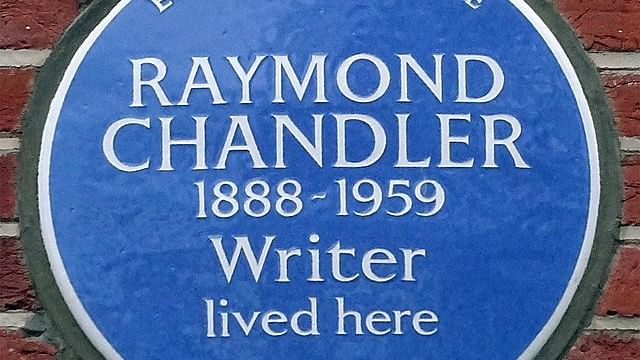
Raymond Chandler home.
Credit: Wikimedia Commons
He was famous for his cynical, hard-drinking gumshoe, Philip Marlowe, and lines like: “It was a blonde. A blonde to make a bishop kick a hole in a stained-glass window.”
But detective novelist Raymond Chandler also tried his hand at the more refined art of poetry, and one of his previously unpublished poems will appear this week in The Strand, a crime and mystery magazine.
The poem, titled Requiem, was written around 1955, and it reveals “a more sentimental, more mystical Raymond Chandler than we’re used to,” said Andrew Gulli, managing editor of The Strand. “We know the wisecracking Philip Marlowe, but Chandler is more complex than we expected.”
The poem had been kept in a shoe box before the Chandler family donated it, along with other papers, to the Bodleian Library at the University of Oxford in the 1980s. “It was a treasure trove of unpublished works,” Gulli said. “But this is the last one.”
Poetry was not new to Chandler, although he had not dabbled in it in many years. “He was fond of poetry and had a poem published in his school newspaper at 17,” Gulli said. But for the bulk of his life, he did not write any poetry.
Chandler did not start writing the detective stories for which he was known until 1933, when he was 44, having previously been a civil servant and an oil executive.
The poem is about 30 lines long. “At times, it reads like a love letter to his wife,” Cissy, who died a year before it was written, Gulli said.
There is a moment after death, yet hardly a moment,
When the bright clothes hang in the scented closet
And the lost dream fades and slowly fades,
When the silver bottles and the glass and the empty mirror,
And three long hairs in a brush and a folded kerchief,
And the fresh made bed and the fresh, plump pillows
On which no head will lie,
Are all that is left of the long, wild dream.
The poem “was part of a stash of works from when he was old and depressed and ill,” Gulli said. “To me, owing to the fact his life went into free fall after she passed away, I’m looking at the work of somebody who had a very difficult time at letting go.”
Chandler’s Marlowe detective novels included The Big Sleep (1939), which was made into a movie with Humphrey Bogart and Lauren Bacall seven years later, and The Long Goodbye (1953).
Forgotten works by famous authors turn up occasionally, sometimes to great fanfare. Unearthed works have included lost novels by Walt Whitman, found in 2017, and Alexandre Dumas, found in 2005.
The biggest splash was made by the publication in 2015 of Go Set a Watchman, Harper Lee’s prequel, written in the 1950s, to To Kill a Mockingbird.
Four chapters of an unfinished Chandler novel, Poodle Springs, were completed by author Robert B. Parker and published in 1988.
Reviews for some discoveries are mixed, or worse. Sometimes, critics say, unpublished works are just not good enough. “Many times when I find something unpublished, I’ll say, ‘this is really garbage,’” Gulli said. “We’ll only publish something that will paint the author in a new light.”
Discoveries of long-lost literature are not a recent phenomenon. “The Persians,” a dithyrambic song by Milesian poet Timotheus from the late fifth century BC, was thought to be lost to time.
Then, after more than 2,000 years, it was rediscovered in an excavation.
“Long-Lost Poem Found in Grave,” read a headline in The New York Times. In 1902.